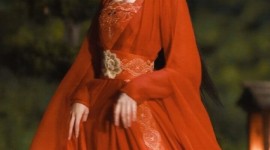Babys Hundred-Day Celebration in Traditional Hanfu:A Cultural Journey
In the heart of China, a cultural celebration marks a significant milestone in the life of a newborn child - the baby's hundred-day ceremony. This ceremony, deeply rooted in the country's rich history and traditions, is an occasion where families gather to honor the baby's journey into the world and to bless their future. Among the various customs associated with this celebration, wearing Hanfu, the traditional Chinese clothing, is a unique and beautiful tradition that continues to thrive.
The Hanfu, a symbol of Chinese culture and identity, has a long history dating back over thousands of years. It represents elegance, harmony, and balance, embodying the principles of traditional Chinese aesthetics. For the baby's hundred-day celebration, the Hanfu is specially designed to fit the tiny baby's body, showcasing the essence of this ancient attire in a new generation.
On this auspicious day, the baby is dressed in a vibrant Hanfu, often adorned with auspicious symbols and patterns. The colors and designs reflect the family's wishes for the child - health, wisdom, and a prosperous future. The baby's parents and grandparents also wear matching Hanfu, creating a beautiful family portrait that captures the essence of this traditional celebration.
The ceremony itself is filled with rituals and blessings. The baby is showered with love and good wishes from family members and friends. There are also traditional games and activities that bring joy and laughter to the occasion. The highlight of the celebration is often the baby's first public appearance in the Hanfu, a moment that is captured in photographs and videos, becoming a cherished memory for the family.
The significance of wearing Hanfu for the baby's hundred-day celebration goes beyond the surface. It is not just about dressing up in traditional attire; it is about connecting with one's cultural roots and acknowledging the rich history that one inherits. It is about instilling values and traditions that will guide the child in their future life.
By donning the Hanfu, families are not only celebrating the baby's milestone but also acknowledging their responsibility to preserve and pass on their cultural heritage to the next generation. The Hanfu, as a symbol of Chinese culture, represents a sense of belonging and identity that is passed down through generations.
In conclusion, the baby's hundred-day celebration in traditional Hanfu is not just a ceremony; it is a cultural journey that connects families with their roots and traditions. It is an occasion that celebrates not only the baby's entry into the world but also the continuation of a rich cultural heritage. As families gather to bless the baby's future, they also reaffirm their commitment to preserving their culture and passing it on to future generations.
This beautiful tradition not only brings joy and happiness to the family but also instills a sense of pride and belonging in children. By wearing Hanfu on this special day, children are reminded of their cultural identity and are encouraged to embrace their roots and heritage. It is a powerful way to connect with one's cultural roots and to celebrate the richness of Chinese culture.
As we witness the beauty of this tradition, we are reminded of our responsibility to preserve and promote our rich cultural heritage. By celebrating the baby's hundred-day ceremony in Hanfu, we are not only honoring our ancestors but also acknowledging our commitment to passing on our culture to future generations. This beautiful tradition will continue to thrive as families across China celebrate this auspicious occasion in style, blending ancient customs with modern elements to create memorable moments that will be cherished for a lifetime.



